
In response to the backlash against Barack Obama’s Prayer Breakfast remarks about violence that had been justified in the name of Christianity, Tah-nehisi Coates wrote an article in which he shared a quote from the Confederacy’s vice-president Alexander Stephens. Stephens’ words are dripping with appeals to God’s sovereign, perfect order to justify the necessity of subordinating one race beneath another. It may look absolutely ridiculous to us today, but Stephens was no doubt writing with absolute sincerity about his convictions. Racial hierarchy was every bit as self-evident a part of God’s divine plan for humanity to pro-slavery Christians back then as gender complementarity is to marriage traditionalists today. This is why I consider appeals to some sort of divinely ordained “natural” order to be every bit as invalid in today’s debates about gender and sexuality as they were in the 19th century debate about slavery.
So here is what Stephens had to say about God’s “natural” order:
With us, all of the white race, however high or low, rich or poor, are equal in the eye of the law. Not so with the negro. Subordination is his place. He, by nature, or by the curse against Canaan, is fitted for that condition which he occupies in our system. The architect, in the construction of buildings, lays the foundation with the proper material-the granite; then comes the brick or the marble. The substratum of our society is made of the material fitted by nature for it, and by experience we know that it is best, not only for the superior, but for the inferior race, that it should be so.
It is, indeed, in conformity with the ordinance of the Creator. It is not for us to inquire into the wisdom of His ordinances, or to question them. For His own purposes, He has made one race to differ from another, as He has made “one star to differ from another star in glory.” The great objects of humanity are best attained when there is conformity to His laws and decrees, in the formation of governments as well as in all things else. Our confederacy is founded upon principles in strict conformity with these laws.
It’s not just the supposed “curse against Canaan” that Stephens could appeal to for support of slavery. For someone reading the Bible with the presupposition that there are inferior and superior races, the Bible provides consistent support throughout its narrative, especially in the accounts of Israel’s interactions with the Canaanites and other rival tribes in their region. The apostle Paul’s rejection of the Jew/Gentile divide in the New Testament could be bracketed and explained away by racial hierarchists back then the same way that his Galatians 3:28 declaration that “there is no longer male and female in Christ” is bracketed and explained away by gender complementarians today. Even with the Jew/Gentile barrier destroyed, the New Testament concept of “the elect” can easily be deployed to support the idea that some races are chosen and others are not.
Essential to Stephens’ racist theology is the idea that there are abstract, ethically opaque “ordinances of the Creator” to which humanity must conform without questioning. By saying “it is not for us to inquire,” Stephens assumes a posture of cynical false humility as though he is reluctantly defending slavery out of obedience to God. It is reminiscent of a scene in one of my favorite movies, The Mission, in which a Jesuit mission to South American natives is shut down by the church hierarchy since the Portuguese and Spanish want to enslave the natives rather than accept them as brothers and sisters in Christ. The cardinal who’s been sent by Rome to shut down the mission tells the native people that God has commanded it (since God’s infallible pope has). When the native chief questions why God would send his people away after having saved them from their heathenism, the cardinal says that he cannot hope to understand God’s mysterious ways. The opaque mystery of God’s will has always provided a convenient, self-serving claim for authority figures within the church trying to sanctify their power.
This is why I cannot accept appeals to the “ordinances of the Creator” that aren’t accompanied by some attempt to understand and describe them in pragmatic, benevolent terms. I reject making use of the claim that God has decreed something “for his own purposes,” because this claim has been leveraged historically by Christians as a cynical justification for their injustice. Whatever God does “for his own purposes” cannot be appropriated by me in a moral argument without it becoming for my purposes instead of God’s.
I believe that God is perfectly good, which means to me not simply that God is without error, but that God is perfectly benevolent and genuinely wants the best for everyone. That basic assumption shapes how I interpret the Bible. With regard to today’s debates about gender and sexuality, I assume the benevolence of Biblical teachings in the context in which these teachings were given. At one point in time, patriarchy seemed like the best way to organize humanity so that women and children could be kept safe from sexual violence. Though some would disagree, I believe that humanity has evolved to the point that patriarchy is now obsolete, which means that Biblical teachings which God provided to his people in order to uphold patriarchy have served their purpose and must be translated into a new social reality in which women no longer need to be protected from mens’ violence through prescribed complementary gender roles.
I don’t think that our post-patriarchal society will collapse into complete chaos if a small percentage of people marry others of their same gender or if we accept the mystery that a very small percentage of people have been born into a body that does not match their real gender. Unless I hear a compelling argument on the basis of genuine benevolence that does more than appeal to an abstract “natural” order or tradition for tradition’s sake, I will continue to maintain that people of non-mainstream sexualities and genders should be granted the same opportunity to live in holy, chaste companionship that cisgender heterosexual people have. And I suspect that a century from now our descendents will be just as embarrassed by the clunky, gender complementarian arguments made today as we are by the racial hierarchical arguments made by sincere Christians like Alexander Stephens in past centuries.












